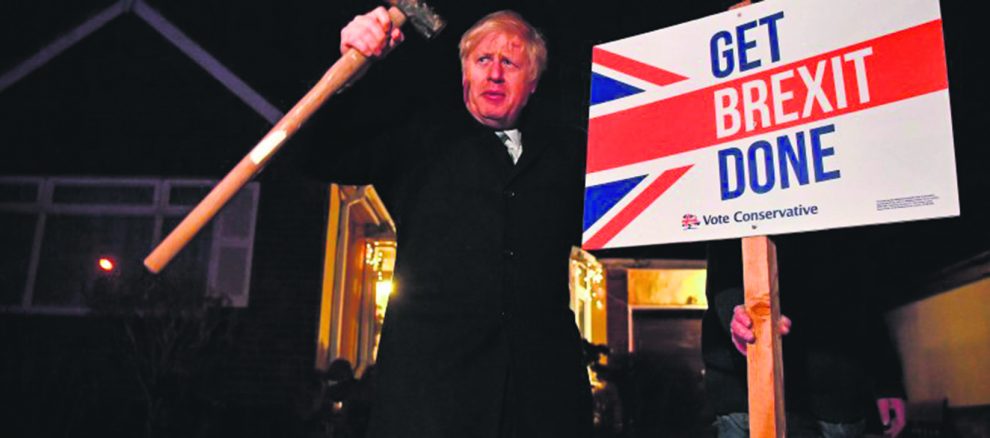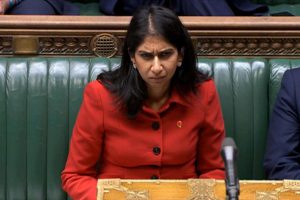by Matthew Paul
For anyone who stood as a candidate for ChangeUK in 2019, and watched over the course of the six-week European Parliament election campaign as mild enthusiasm on the part of the British public cooled into vague embarrassment before crystallising into disgust, it’s nice to see the Remoaners on the rebound. Brexit is back in the news, and causing big trouble for Boris Johnson.
“But Brexit”, you exclaim, “is done! Didn’t we have a General Election to sort that out? Didn’t our MPs vote for an oven-ready deal, back on 20th December last year?”
They did, but if the deal was supposed to be oven-ready, Boris left the plastic bag full of giblets inside and it is causing a terrible stink. Those unpalatable entrails are the ongoing and irreconcilable tensions between wanting our own laws and trade arrangements, and maintaining an open border between the UK and the Republic of Ireland.
The United Kingdom is one single market; Wales cannot exclude or impose tariffs on goods from Scotland, England or Northern Ireland, and vice versa. This was the case for nearly three hundred years before the UK joined the EEC in 1973; when it did join, UK citizens swapped one single market of (then) 56 million for a single market that grew to ten times that size. The advantages of this, to our exporting economy, were obvious.
Leaving that wider single market creates a problem, which is also obvious. There is a land border between the UK and Ireland, which international law (the Good Friday Agreement) says must remain open. If the UK uses its freedom from EU tyranny to strike new trade deals and to remove ‘foreign laws’ around food safety and product standards –which was the whole point of Brexit– it compromises the integrity of European product standards by allowing chlorinated chicken etc etc to pass, unchecked and untaxed, into the EU.
There is no reason why the EU should put up with this, and throughout Brexit talks the Commission made it clear that retaining an open border in Ireland is non-negotiable. There is only one straightforward alternative: a customs border in the Irish Sea between the island of Ireland and Great Britain. In June 2018, Theresa May was leaning in that direction, but this proposed solution –breaking up the territorial integrity of the UK to protect the integrity of the EU single market– was so detestable to the Spartans of the ERG that they passed a law specifically to stop May from doing it.
Fast forward to December 2019, and the same Spartans, cowed by Boris’ ruthless public execution of the 21 Remainers who rebelled against his Government’s Brexit policy, followed the PM like sheep through the Ayes lobby to endorse his oven-ready deal with an Irish Sea border as its defining characteristic. Boris said at the time that this would not create paperwork for businesses exporting goods from NI to the rest of the UK. He lied: the deal dictates that the UK keeps the NI/ ROI border open, implements the EU customs code in Northern Ireland, and obliges exporters to fill in declarations on goods going between NI and the rest of the UK.
Perhaps Boris just thought no-one would notice, even though everyone did. Perhaps he thought the EU would quietly back down on imposing the customs code. If this was the Government’s plan, it reinforces the impression that the Government is incapable of planning past lunchtime. The EU continued to insist stoutly on the terms of the deal being honoured. Finding himself well down in the game, Boris kicked over the card table. He presented the House of Commons with the Internal Market Bill, section 45 of which gives the Government power simply to ignore or override the Northern Ireland Protocol, to allow seamless trade and consistent regulation between all constituent parts of the UK.
M’learned friends, blanching at the idea of tearing up treaties, were the first to cry foul. The government’s top lawyer, Sir Jonathan Jones, walked out of his job in despair. On Wednesday Lord Keen –the Government’s law officer for Scotland– resigned too, rather than adopt the intellectual contortions necessary to support the Bill. Even Robert Buckland, the likeable if impressionable Lord Chancellor, who previously mounted a sorry-faced hostage-video defence of Boris’s prorogation of Parliament and would be about as likely as the woolsack he sits on to rebel against Government policy, is shuffling uncomfortably. It’s not just the Remoaners, either; unless dark Lord of the Sith Michael Howard, and former Attorney-General and basso-profondo Brexithorn Sir Geoffrey Cox are now to be classed as Remoaners.
Some of the pearl-clutching over the sanctity of international law is misplaced. As De Gaulle observed, “Les traités, voyez-vous, sont comme les jeunes filles et les roses: ça dure ce que ça dure.” The EU regards any emanation of international law that questions the acquis Communautaire with withering contempt, and owes zillions of dollars in WTO fines for breaching international law with state aid to Airbus.
It comes down to a question of power, to a clear-headed assessment of whether or not you are going to win, and to whether the prize to be gained offsets the reputational damage of reneging on international obligations. Tearing up a treaty signed only months before is crass and looks weak. Kicking over the card table when you’re losing isn’t a great move if the other player then shoots you dead.
If the Government really wants to scare people about the effects of the Coronavirus, it could do worse than loop videos of Boris in December compared to Boris now. The hoo-ha over the Internal Market Bill is one more unforced mistake; the thickening miasma of incompetence and bad judgement is weakening this Government like a nasty dose of the Covid. On Tuesday, Boris fiddled with his phone through PMQs while Ed Miliband –Ed Miliband!– cut the hopelessly depleted Prime Minister to bits in front of a drolly amused House; Boris put up less resistance than a bacon sandwich.

















